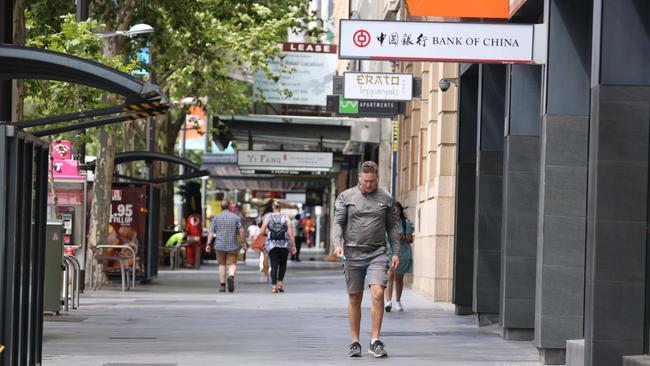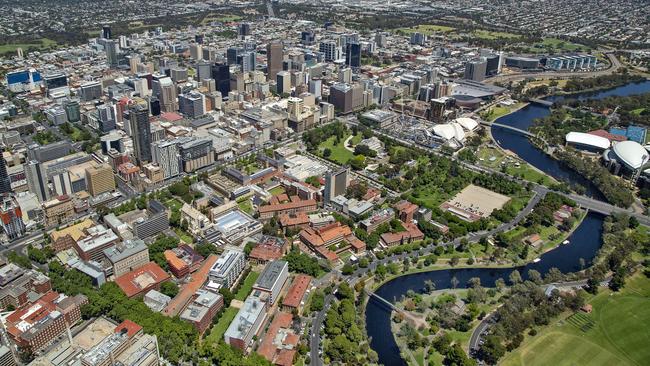Colin James: Time for South Australians to reclaim the Adelaide CBD from Covid
Business heavyweight Theo Maras didn’t pull any punches blasting Steven Marshall and a stroll through the dying CBD reveals why, writes Colin James.
Opinion
Don't miss out on the headlines from Opinion. Followed categories will be added to My News.
Theo Maras didn’t pull his punches this week when he blasted Premier Steven Marshall for opening the state’s borders without knowing the full threat posed by Omicron.
The outburst was prompted by watching businesses in his beloved East End and across the city wither from the departure of thousands of CBD office workers.
It was one particular incident which pushed the wealthy property developer over the edge. He was sitting at his usual table at Rundle St restaurant Eros when he saw two of its young waitresses sitting outside. One of them was crying so Maras asked her what was wrong.
“She told me her hours had been cut to one shift a week,” he told me over lunch on Monday. “How can anyone pay their bills, get petrol for their car, cover their mortgage, put bread and butter on the table on eight hours a week? They can’t.”
The waitress’s situation is a common one across the CBD, which has been pummeled for the third time since the pandemic began in early 2020 by the exodus of office workers, continuing absence of overseas students and ongoing dearth of interstate and overseas visitors.

Walking to work yesterday from Grenfell St to Waymouth St, from an almost empty articulated bus, caught from a half empty O-Bahn interchange carpark, I passed one restaurant with three customers instead of the usual dozens, five empty snack bars and two closed cafes. That was on a 500m stroll.
Last weekend, when my youngest son turned 19, we went to a usually packed city hotel for a family dinner. I booked a table for five. We were the only ones in there apart from a couple on another table.
The situation in the Adelaide CBD is the most dire I have seen since coming back to work from the first extended lockdown in July two years ago. This is why it is so important office workers heed Mr Marshall’s call yesterday to start returning to their desks. If many CBD businesses do not start getting more trade, they may not survive. This includes everyone from barbers, shoe repairers, newsagents and fashion retailers to small bars, cafes, hotels and restaurants. A vibrant city is vital to the economy of the state. The Square Mile is – and always has been – the beating heart of South Australia.

Adelaide City Council soon will start rolling out a $7.5m strategy aimed at rejuvenating the city. In a rare display of much-needed unity, elected members approved a range of measures to get people back into Rundle Mall, dining and entertainment precincts and city offices.
The plan was spurred by North Adelaide councillor Phillip Martin, who didn’t particularly help lift the morale of struggling businesses when he told a special council meeting the CBD had become a “ghost town” because people were frightened of catching Covid in the city. Calling for a special meeting to discuss an action plan, he said the CBD had one of the highest numbers of active Covid cases of any local government area. What he did not say was that most of those cases were people confined to four medi-hotels, which have been accommodating Covid-infected guests since the pandemic began in January, 2020.
Mr Martin also did not say that none of the council-organised parties on New Year’s Eve across the city caused Covid outbreaks. They included 5000 people attending a ticketed fireworks event at Rymill Park. Unlike numerous cases from the Henley High School reunion at Norwood, SA Health reported no Covid cases from the events, all of which were held outdoors. They featured street dining, live music and pyrotechnic displays.

The success of New Year’s Eve is proof that events within the city can be held safely. This is crucially important with the approaching Mad March festival season, with Covid management plans being finalised for the Fringe, Adelaide Festival and WOMADelaide.
As was clearly evident last year, tens of thousands of people safely attended hundreds of shows at different venues across the CBD without catching Covid. The privately operated Garden of Unearthly Delights and Gluttony redesigned the layouts of their expansive East Tce sites to create greater social distancing while patrons willingly used QR check-ins and wore face masks at indoor venues, ranging from large tents to hotel bars.
Festival organisers are relying on the public to show similar compliance this year. With full vaccination levels now past 90 per cent and the spread of the Omicron variant hopefully reaching its peak, there is no reason why Mad March cannot be the economic booster the CBD so desperately needs.
In the meantime, the public must support urgent activation activities planned by the council like street parties, outdoor dining and live concerts.
Holding more events outdoors is a logical step to deal with Covid, which quickly is turning into the microbiological equivalent of a Rubik’s cube. Adelaide is perfectly placed to transform how we spend our time together. Getting outside, in the open air, is the ideal way forward. The parklands which surround the city provide ample options for various forms of live entertainment and public art.
Struggling small bars, cafes, restaurants and hotels will welcome the business the crowds will bring.
With news emerging from overseas of yet another variant, the “son of Omicron” or BA. 2, we must accept the pandemic is not ending any time soon and change our thinking – and behaviour.




